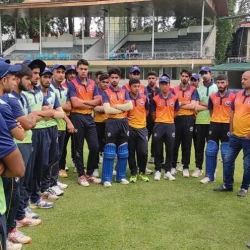India-Pakistan Asia Cup Final Sparks Controversy
The Indian cricket team refused to accept the Asia Cup trophy after defeating Pakistan by five wickets in the final held in Dubai, UAE on September 29, 2025.
The match, the third encounter between the two rivals in the tournament, took place just four months after heightened military tensions between India and Pakistan following the April 22 Pahalgam attack in Indian-administered Kashmir.
Reason Behind India’s Refusal
India declined to receive the trophy because it was to be presented by Mohsin Naqvi, who serves as both Asian Cricket Council (ACC) president and Pakistan Cricket Board (PCB) chairman, as well as Pakistan’s federal interior minister.
Devajit Saikia, BCCI chairman, stated:
“We have decided not to take the Asia Cup trophy from the ACC chairman, who is also a leading political figure in Pakistan.”
He clarified that the trophy and medals would be returned to India promptly, though the team chose not to formally receive them on stage.
Events During the Presentation
The trophy presentation, delayed until midnight, was marked by unusual events:
-
An official removed the champions trophy from the dais without explanation.
-
Indian players, including Kuldeep Yadav, Abhishek Sharma, and Tilak Varma, received individual awards from other dignitaries instead.
-
Pakistani captain Salman Agha collected the runners-up cheque from Naqvi.
Indian captain Suryakumar Yadav confirmed the decision to refuse the trophy was made by the team, stating:
“It was our choice. We are proud of the win, but we cannot accept the trophy from him given the circumstances.”
Political and Military Context
India-Pakistan relations have been strained for years and deteriorated sharply after the April Pahalgam attack, in which 26 tourists were killed. India attributes the attack to Pakistan-backed groups, which Pakistan denies.
In response, India launched Operation Sindoor, striking multiple sites in Pakistan and Pakistan-administered Kashmir, while Pakistan countered with Operation Bunyan Marsoos, targeting Indian military positions. A ceasefire was later brokered with the involvement of the United States.
Cricket Diplomacy vs Political Tensions
Historically, cricket has served as a diplomatic bridge between India and Pakistan:
-
In the 1980s and 1990s, cricket matches were used for peace gestures and diplomatic talks.
-
Leaders, including Pakistani Presidents Zia-ul-Haq and Pervez Musharraf and Indian Prime Ministers Manmohan Singh and Narendra Modi, attended matches to ease tensions.
However, ongoing political and military conflicts have undermined cricket diplomacy, turning matches into symbolic political battlegrounds rather than platforms for peace.
Tensions on the Field
The Asia Cup final reflected these strains:
-
Indian players refused to shake hands with Pakistani cricketers after previous matches.
-
Captain Suryakumar Yadav dedicated wins to the Indian armed forces, citing the Pahalgam attack victims.
-
Incidents on the field, such as gestures by Pakistani players referencing the May military clashes, heightened tensions among fans and players alike.
Reactions from Leaders
-
PM Narendra Modi celebrated India’s win, referring to it as “#OperationSindoor on the games field.”
-
Mohsin Naqvi criticized the politicization of sports, stating that “dragging politics into the game goes against the spirit of sports.”
Experts note that India’s refusal to accept the trophy reflects broader diplomatic and political positions, including distancing from Pakistan on trade, borders, and counterterrorism.
Key Takeaway
The Asia Cup trophy controversy highlights how political tensions between India and Pakistan continue to affect cricket. While India won on the field, unresolved issues and strained diplomacy turned the victory into a symbolic protest, underscoring the challenges of separating sports from politics in high-stakes matches.















